
Sen. John Bell (D-Loudoun)
by Dick Hall-Sizemore
Once again, the General Assembly has killed legislation that would prohibit politicians from using campaign donations to cover personal expenses. It is easy to express outrage at this almost annual occurrence, but, in doing some background research on the subject, I encountered some details that, on the one hand, provide a fuller picture of this this struggle, but, on the other hand, make the opposition even more perplexing, if not hypocritical.
Background
The law
Upon the filing of a final report of campaign donations and expenses and disposing of surplus funds, the law prohibits “any person to convert any contributed moneys, securities, or like intangible personal property to his personal use or to the use of a member of the candidate’s immediate family.” However, a “final report” needs to be filed only in any of the following circumstances: “when (i) a candidate no longer seeks election to the same office in a successive election, (ii) a candidate seeks election to a different office, or (iii) the candidate is deceased.” Thus, as long as a member of the House or Senate continues to run for re-election for his seat, he can keep his campaign books open, filing only the required periodic reports. There is no law that prohibits using donations for personal use during that time. Several years ago, the Associated Press reported on several instances in which legislators were clearly using campaign donations to pay for personal expenses.
The objections
Perhaps the primary objection to any legislation prohibiting personal use of campaign donations is the idea that the line between legitimate campaign use and personal benefit can be blurry at times. A definition of a legitimate use of campaign funds used in some proposed legislation was: “ordinary and accepted expenses related to campaigning for or holding elective office.” However, some members still expressed a concern that the law could create “gotcha” situations which would be used against them by their opponents.
A frequent example involved food provided by a campaign, with such questions as: Can I eat some of the pizza that my campaign ordered for volunteers at a function? If there is food left over, can I take it home for me and my family to eat the next day?
Some raised questions about the purchase of clothes, such as: Some candidates are not well off enough to have a closet full of nice suits to wear during campaign appearances. Can campaign donations be used to buy them nicer clothes? Can campaign donations be used for dry cleaning my suits? Another common concern was child care: Some women may have young children for whom they would need child care. Can campaign donations be use for those expenses?
As a result of such concerns, legislators often would not be satisfied with just saying that campaign donations can be used for “ordinary and accepted expenses,” but would, instead, get bogged down in trying to define more specifically what the campaign funds could or could not be used for. As a result, the bills died.
It is sometimes difficult to determine if these were really legitimate concerns or if they were being raised as a means to ultimately kill the bills.
2021 Session
HB 1952
There have been attempts in prior years to put some limitations on the personal use of campaign donations. In the 2021 session, a long-time advocate for such limitations, Delegate Marcus Simon, D-Fairfax, introduced HB 1952, which was simple and straightforward. It declared it unlawful to convert campaign money to the personal use of the candidate or the candidate’s immediate family. It defined “personal use” as “ordinary and accepted expenses related to campaigning for or holding elective office, including the use of campaign funds for the candidate’s child care expenses that are incurred as a direct result of campaign activity.” It passed the House, 100-0.
The Senate, however, was not content to go along with the general language. The bill was reported out of committee, but there were so many concerns expressed (“What if?” questions) that a floor substitute was introduced to try to assuage the concerns. But it was not enough and the bill was returned to committee to die.
Joint Subcommittee
The 2021 General Assembly did establish a Joint Subcommittee on Comprehensive Campaign Finance Reform (HJR 526). At the end of July, the subcommittee had not yet met. As reported by the Virginia Mercury, several members seemed doubtful if much meaningful work could be done and Senator Creigh Deeds, D-Bath, one of the joint subcommittee’s co-chairmen, suggested, “some of his colleagues saw the study as an ‘excuse’ not to act on the proposal to ban personal use of campaign funds.” The joint subcommittee did meet in mid-August, but there is no record easily accessible to the public that it ever met again. The joint subcommittee was to report by Nov. 1, 2021, but no report has been submitted.
2022 Session
Despite its dickering in the last session, the Senate managed to pass a limited bill this year, SB 463 (Bell, D-Loudoun), by a vote of 37-3. The bill that passed prohibited converting campaign donations to personal use. It went to define “personal use” as follows:
For the purpose of this subsection, a contribution shall be considered to be converted to personal use if the contribution is used to fulfill any commitment, obligation, or expense of a person that would exist irrespective of the person’s seeking, holding, or maintaining public office, which includes the following:
- A home mortgage, rent, or utility payment.
- A non-campaign-related automobile expense.
- A country club membership.
- A vacation or other non-campaign-related trip.
- Admission to a sporting event, concert, theater, or other form of entertainment not associated with an election campaign.
- Dues, fees, and other payments to a health club or recreational facility
Anyone who made a contribution to the candidate or was qualified to vote in the election for the office for which the candidate was running would be eligible to file a complaint with the Department of Elections concerning the personal use of campaign donations by a candidate or officeholder. If the candidate or officeholder chose to refund the funds in question at any time during the department’s investigation, the complaint would be dropped. If the department found that campaign funds had been converted to personal use, the candidate or officeholder would be subject to civil fines.
Although the legislation sets out six specifically prohibited uses of campaign funds, the prohibition against personal use is not limited to those uses. The legislation directs the Department of Elections and the Attorney General to “develop and publish guidance on the provisions of the Act that prohibit the personal use of campaign funds.”

Delegate Margaret Ransone, R-Westmoreland. Picture credit: Rappahannock Record
In presenting the bill to a subcommittee of the House Privileges and Elections Committee, Senator Bell acknowledged that the bill was not perfect, but stressed that it was a start at tackling a complex subject. He argued that the bill identified the most egregious examples of personal use for which campaign funds could not be used. Delegate Margaret Ransone, R-Westmoreland, chair of the full committee who was sitting in on the meeting but did not vote, objected to “putting something in the Code that was not perfect.” (That seems like it could be a convenient excuse for voting against at least 95% of the bills in any session!)
The subcommittee killed the bill on a party-line vote of 5-3. Voting against were the following Republicans: O’Quinn (Washington), Bloxom (Accomack), Williams (Patrick), Taylor (Chesterfield), and Wachsmann (Sussex). Both O’Quinn and Bloxom had voted for the prohibition in 2018, 2019, and 2021. (The other three Republicans on the subcommittee were newly-elected members.) Asked why they had flip-flopped in their positions, both O’Quinn and Bloxom gave nonsensical answers O’Quinn’s cryptic explanation was, “Sometimes things that pass don’t, and sometimes things that never passed all of the sudden do.” Bloxom said that he preferred comprehensive reform legislation. “Doing it piecemeal, as far as I’m concerned, we begin to set ourselves up for traps,” he argued. (Of course, that does not explain why he voted for such “piecemeal” legislation at least three times in past years.)
Delegate Marcus Simon, D-Fairfax, offered another explanation for the sudden reversal of some House Republicans. In a floor speech, he accused Republicans of supporting it in the past because they had a “free pass,” knowing that it would get killed in the Senate. This year, however, the situation was different. The Senate had passed a bill and, therefore, it looked like it might actually become law if House Republicans supported it.
As one campaign finance reform advocate commented last year, “Campaign finance reform in Virginia is like the movie ‘Groundhog Day.’”


